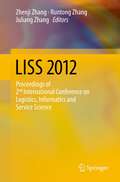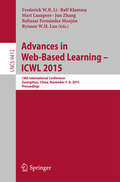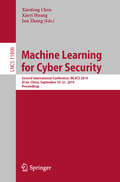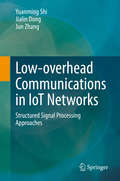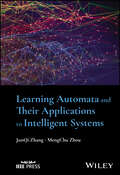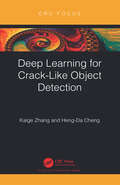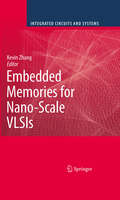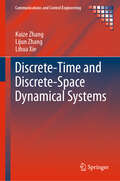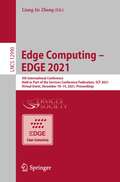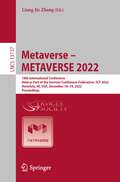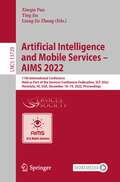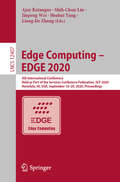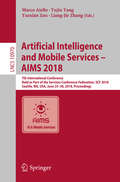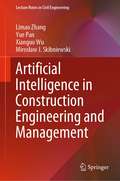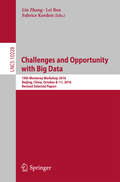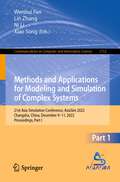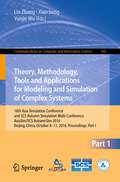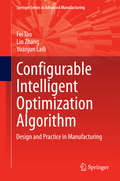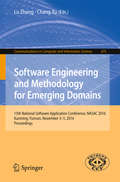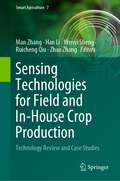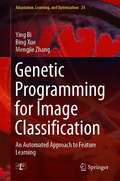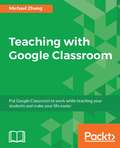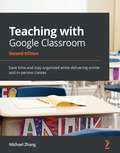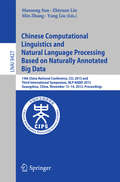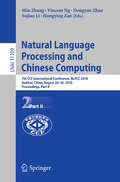- Table View
- List View
LISS 2012
by Juliang Zhang Runtong Zhang Zhenji ZhangInformation and communication technology has helped to provide a more effective network infrastructure and development platform for logistics and service operations. In order to meet the needs of consumers, and particularly to promote low-carbon development processes, new types of services will also emerge. LISS 2012 is a prime international forum for both researchers and industry practitioners to exchange the latest fundamental advances in the state of the art and practice of logistics, informatics, service operations and service science. Experts and researchers from related fields will discuss current issues and future development opportunities, discuss and analyze developing trends and exchange the latest research and academic thought. The theme of the conference is Logistics and Service Science based on the Internet of Things.
Advances in Web-Based Learning -- ICWL 2015: 14th International Conference, Guangzhou, China, November 5-8, 2015, Proceedings (Lecture Notes in Computer Science #9412)
by Jun Zhang Frederick W.B. Li Ralf Klamma Mart Laanpere Baltasar Fernández Manjón Rynson W.H. LauThis book constitutes the refereed proceedings of the 14th International Conference on Web-Based Learning, ICWL 2015, held in Guangzhou, China, in Noavember 2015. The 18 revised full papers presented together with 2 invited papers and 7 short papers were carefully reviewed and selected from about 79 submissions. The papers are organized in topical sections on collaborative and peer learning; e-lerning platform and tolls; design, model, and framework of e-learning systems; intelligent tutoring and tools; pedagogical issues; personalized and adaptive learning; and Web 2. 0 and social learning environments.
Machine Learning for Cyber Security: Second International Conference, ML4CS 2019, Xi’an, China, September 19-21, 2019, Proceedings (Lecture Notes in Computer Science #11806)
by Jun Zhang Xinyi Huang Xiaofeng ChenThis book constitutes the proceedings of the Second International Conference on Machine Learning for Cyber Security, ML4CS 2019, held in Xi’an, China in September 2019. The 23 revised full papers and 3 short papers presented were carefully reviewed and selected from 70 submissions. The papers detail all aspects of machine learning in network infrastructure security, in network security detections and in application software security.
Low-overhead Communications in IoT Networks: Structured Signal Processing Approaches
by Jun Zhang Yuanming Shi Jialin DongThe recent developments in wireless communications, networking, and embedded systems have driven various innovative Internet of Things (IoT) applications, e.g., smart cities, mobile healthcare, autonomous driving and drones. A common feature of these applications is the stringent requirements for low-latency communications. Considering the typical small payload size of IoT applications, it is of critical importance to reduce the size of the overhead message, e.g., identification information, pilot symbols for channel estimation, and control data. Such low-overhead communications also help to improve the energy efficiency of IoT devices. Recently, structured signal processing techniques have been introduced and developed to reduce the overheads for key design problems in IoT networks, such as channel estimation, device identification, and message decoding. By utilizing underlying system structures, including sparsity and low rank, these methods can achieve significant performance gains.This book provides an overview of four general structured signal processing models: a sparse linear model, a blind demixing model, a sparse blind demixing model, and a shuffled linear model, and discusses their applications in enabling low-overhead communications in IoT networks. Further, it presents practical algorithms based on both convex and nonconvex optimization approaches, as well as theoretical analyses that use various mathematical tools.
Learning Automata and Their Applications to Intelligent Systems
by JunQi Zhang MengChu ZhouComprehensive guide on learning automata, introducing two variants to accelerate convergence and computational update speed Learning Automata and Their Applications to Intelligent Systems provides a comprehensive guide on learning automata from the perspective of principles, algorithms, improvement directions, and applications. The text introduces two variants to accelerate the convergence speed and computational update speed, respectively; these two examples demonstrate how to design new learning automata for a specific field from the aspect of algorithm design to give full play to the advantage of learning automata. As noisy optimization problems exist widely in various intelligent systems, this book elaborates on how to employ learning automata to solve noisy optimization problems from the perspective of algorithm design and application. The existing and most representative applications of learning automata include classification, clustering, game, knapsack, network, optimization, ranking, and scheduling. They are well-discussed. Future research directions to promote an intelligent system are suggested. Written by two highly qualified academics with significant experience in the field, Learning Automata and Their Applications to Intelligent Systems covers such topics as: Mathematical analysis of the behavior of learning automata, along with suitable learning algorithms Two application-oriented learning automata: one to discover and track spatiotemporal event patterns, and the other to solve stochastic searching on a line Demonstrations of two pioneering variants of Optimal Computing Budge Allocation (OCBA) methods and how to combine learning automata with ordinal optimization How to achieve significantly faster convergence and higher accuracy than classical pursuit schemes via lower computational complexity of updating the state probabilityA timely text in a rapidly developing field, Learning Automata and Their Applications to Intelligent Systems is an essential resource for researchers in machine learning, engineering, operation, and management. The book is also highly suitable for graduate level courses on machine learning, soft computing, reinforcement learning and stochastic optimization.
Deep Learning for Crack-Like Object Detection
by Kaige Zhang Heng-Da ChengComputer vision-based crack-like object detection has many useful applications, such as inspecting/monitoring pavement surface, underground pipeline, bridge cracks, railway tracks etc. However, in most contexts, cracks appear as thin, irregular long-narrow objects, and often are buried in complex, textured background with high diversity which make the crack detection very challenging. During the past a few years, deep learning technique has achieved great success and has been utilized for solving a variety of object detection problems. This book discusses crack-like object detection problem comprehensively. It starts by discussing traditional image processing approaches for solving this problem, and then introduces deep learning-based methods. It provides a detailed review of object detection problems and focuses on the most challenging problem, crack-like object detection, to dig deep into the deep learning method. It includes examples of real-world problems, which are easy to understand and could be a good tutorial for introducing computer vision and machine learning.
Embedded Memories for Nano-Scale VLSIs
by Kevin ZhangThe book provides a comprehensive and in-depth view on the state-of-the-art embedded memory technologies. The book helps practicing engineers grasp key technology attributes and advanced design techniques in nano-scale VLSI design. It also helps them make decisions concerning the right design tradeoffs in real product development. This book first provides an overview on the landscape and trend of embedded memory in various VLSI system designs, including high-performance microprocessor, low-power mobile handheld devices, micro-controllers, and various consumer electronics. It then shows an in-depth view on each different type of embedded memory technology, including high-speed SRAM, ultra-low-voltage and alternative SRAM, embedded DRAM, embedded nonvolatile memory, and emerging or so-called "universal" memories such as FeRAM, MRAM, and PRAM. Each topic covers all the key technology attributes from a product application perspective, ranging from technology scaling challenges to advanced circuit techniques for achieving optimal design tradeoff in performance and power. As VLSI systems become increasingly dependent on on-die memory to provide adequate memory bandwidth for various applications, the book gives readers a broader view of this important field and helps them to achieve their optimal design goals for different applications. This book provides readers a broad knowledge on the entire embedded memory technologies in order to better comprehend the technologies and create optimal memory solutions in real applications.
Discrete-Time and Discrete-Space Dynamical Systems (Communications and Control Engineering)
by Kuize Zhang Lijun Zhang Lihua XieDiscrete-Time and Discrete-Space Dynamical Systems provides a systematic characterization of the similarities and differences of several types of discrete-time and discrete-space dynamical systems, including:Boolean control networks;nondeterministic finite-transition systems;finite automata;labelled Petri nets; andcellular automata.The book's perspective is primarily based on topological properties though it also employs semitensor-product and graph-theoretic methods where appropriate. It presents a series of fundamental results: invertibility, observability, detectability, reversiblity, etc., with applications to systems biology.Academic researchers with backgrounds in applied mathematics, engineering or computer science and practising engineers working with discrete-time and discrete-space systems will find this book a helpful source of new understanding for this increasingly important class of systems. The basic results to be found within are of fundamental importance for further study of related problems such as automated synthesis and safety control in cyber-physical systems using formal methods.
Edge Computing – EDGE 2021: 5th International Conference, Held as Part of the Services Conference Federation, SCF 2021, Virtual Event, December 10–14, 2021, Proceedings (Lecture Notes in Computer Science #12990)
by Liang-Jie ZhangThis book constitutes the proceedings of the International Conference on Edge Computing, EDGE 2021, held virtually as part of SCF 2021, held as a Virtual Event, December 10–14, 2021. The 5 full and 2 short papers presented in this volume were carefully reviewed and selected from 18 submissions. The conference proceeding EDGE 2021 presents the latest fundamental advances in the state of the art and practice of edge computing, identify emerging research topics, and define the future of edge computing.
Metaverse – METAVERSE 2022: 18th International Conference, Held as Part of the Services Conference Federation, SCF 2022, Honolulu, HI, USA, December 10–14, 2022, Proceedings (Lecture Notes in Computer Science #13737)
by Liang-Jie ZhangThis book constitutes the refereed proceedings of the 18th METAVERSE 2022 conference, held as part of the Services Conference Federation, SCF 2022, in December 2022 in Honolulu, USA. The 7 full papers and 3 short papers presented were carefully reviewed and selected from 21 submissions. The papers cover topics in the field of Advertising Services, Banking Services, Broadcasting & Cable TV Service, Business Services, Communications Services, Government Services, Real Estate Operations Services, Schools and Education Services, Healthcare Services, and much more.
Artificial Intelligence and Mobile Services – AIMS 2022: 11th International Conference, Held as Part of the Services Conference Federation, SCF 2022, Honolulu, HI, USA, December 10–14, 2022, Proceedings (Lecture Notes in Computer Science #13729)
by Liang-Jie Zhang Xiuqin Pan Ting JinThis book constitutes the proceedings of the 11th International Conference on Artificial Intelligence and Mobile Services, AIMS 2022, held as Part of the Services Conference Federation, SCF 2022, held in Honolulu, HI, USA, in December 2022. The 10 full papers presented in this volume were carefully reviewed and selected from 22 submissions.The International Conference on AI & Mobile Services (AIMS 2022) aims at providing an international forum that is dedicated to exploring different aspects of AI (from technologies to approaches and algorithms) and mobile services (from business management to computing systems, algorithms, and applications) to promoting technological innovations in research and development of mobile services, including, but not limited to, wireless & sensor networks, mobile & wearable computing, mobile enterprise & eCommerce, ubiquitous collaborative & social services, machine-to-machine & Internet-of-things clouds, cyber-physical integration, and big data analytics for mobility-enabled services.
Edge Computing – EDGE 2020: 4th International Conference, Held as Part of the Services Conference Federation, SCF 2020, Honolulu, HI, USA, September 18-20, 2020, Proceedings (Lecture Notes in Computer Science #12407)
by Liang-Jie Zhang Jinpeng Wei Ajay Katangur Shih-Chun Lin Shuhui YangThis book constitutes the proceedings of the International Conference on Edge Computing, EDGE 2020, held virtually as part of SCF 2020, in Honolulu, HI, USA, in September 2020. The 7 full and 2 short papers presented in this volume were carefully reviewed and selected from 13 submissions.The conference proceeding EDGE 2020 presents the latest fundamental advances in the state of the art and practice of edge computing, identify emerging research topics, and define the future of edge computing.
Artificial Intelligence and Mobile Services – AIMS 2018: 7th International Conference, Held as Part of the Services Conference Federation, SCF 2018, Seattle, WA, USA, June 25-30, 2018, Proceedings (Lecture Notes in Computer Science #10970)
by Liang-Jie Zhang Yuexian Zou Yujiu Yang Marco AielloThis book constitutes the proceedings of the International Conference on Artificial Intelligence and Mobile Services, AIMS 2018, held as part of SCF 2018, in Seattle, WA, USA, in June 2018. The 20 papers presented in this volume were carefully reviewed and selected from numerous submissions. The papers cover different aspects of mobile services from business management to computing systems, algorithms and applications. They promote technological technological innovations in research and development of mobile services, including, but not limited to, wireless and sensor networks, mobile and wearable computing, mobile enterprise and eCommerce, ubiquitous collaborative and social services, machine-to-machine and Internet-of-things, clouds, cyber-physical integration, and big data analytics for mobility-enabled services
Artificial Intelligence in Construction Engineering and Management (Lecture Notes in Civil Engineering #163)
by Limao Zhang Yue Pan Xianguo Wu Mirosław J. SkibniewskiThis book highlights the latest technologies and applications of Artificial Intelligence (AI) in the domain of construction engineering and management. The construction industry worldwide has been a late bloomer to adopting digital technology, where construction projects are predominantly managed with a heavy reliance on the knowledge and experience of construction professionals. AI works by combining large amounts of data with fast, iterative processing, and intelligent algorithms (e.g., neural networks, process mining, and deep learning), allowing the computer to learn automatically from patterns or features in the data. It provides a wide range of solutions to address many challenging construction problems, such as knowledge discovery, risk estimates, root cause analysis, damage assessment and prediction, and defect detection. A tremendous transformation has taken place in the past years with the emerging applications of AI. This enables industrial participants to operate projects more efficiently and safely, not only increasing the automation and productivity in construction but also enhancing the competitiveness globally.
Challenges and Opportunity with Big Data: 19th Monterey Workshop 2016, Beijing, China, October 8 – 11, 2016, Revised Selected Papers (Lecture Notes in Computer Science #10228)
by Lin Zhang Fabrice Kordon Lei RenThis book presents the thoroughly refereed and revised post-workshop proceedings of the 19th Monterey Workshop, held in Beijing, China, in Ocotber 2016. The workshop explored the challenges associated with the Development, Operation and Management of Large-Scale complex IT Systems. The 18 revised full papers presented were significantly extended and improved by the insights gained from the productive and lively discussions at the workshop, and the feedback from the post-workshop peer reviews. 2016 marks the 23rd anniversary for the Monterey Workshop series which started in 1993. For nearly a quarter of century, the Monterey Workshops have established themselves as an important international forum to foster, among academia, industry, and government agencies, discussion and exchange of ideas, research results and experience in developing software intensive systems, and have significantly advanced the field. The community of the workshop participants has grown to become an influential source of ideas and innovations and its impact on the knowledge economy has been felt worldwide.
Methods and Applications for Modeling and Simulation of Complex Systems: 21st Asia Simulation Conference, AsiaSim 2022, Changsha, China, December 9-11, 2022, Proceedings, Part I (Communications in Computer and Information Science #1712)
by Lin Zhang Xiao Song Wenhui Fan Ni LiThe two-volume set CCIS 1712 and 1713 constitutes the proceedings of the 21st Asian Simulation Conference, AsiaSim 2022, which took place in Changsha, China, in January 2023. Due to the Covid pandemic AsiaSim 2022 has been postponed to January 2023. The 97 papers presented in the proceedings were carefully reviewed and selected from 218 submissions. The contributions were organized in topical sections as follows: Modeling theory and methodology; Continuous system/discrete event system/hybrid system/intelligent system modeling and simulation; Complex systems and open, complex and giant systems modeling and simulation; Integrated natural environment and virtual reality environment modeling and simulation; Networked Modeling and Simulation; Flight simulation, simulator, simulation support environment, simulation standard and simulation system construction; High performance computing, parallel computing, pervasive computing, embedded computing and simulation; CAD/CAE/CAM/CIMS/VP/VM/VR/SBA; Big data challenges and requirements for simulation and knowledge services of big data ecosystem; Artificial intelligence for simulation; Application of modeling/simulation in science/engineering/society/economy /management/energy/transportation/life/biology/medicine etc; Application of modeling/simulation in energy saving/emission reduction, public safety, disaster prevention/mitigation; Modeling/simulation applications in the military field; Modeling/simulation applications in education and training; Modeling/simulation applications in entertainment and sports.
Theory, Methodology, Tools and Applications for Modeling and Simulation of Complex Systems: 16th Asia Simulation Conference and SCS Autumn Simulation Multi-Conference, AsiaSim/SCS AutumnSim 2016, Beijing, China, October 8-11, 2016, Proceedings, Part I (Communications in Computer and Information Science #643)
by Lin Zhang Xiao Song Yunjie WuThis four-volume set (CCIS 643, 644, 645, 646) constitutes the refereed proceedings of the 16th Asia Simulation Conference and the First Autumn Simulation Multi-Conference, AsiaSim / SCS AutumnSim 2016, held in Beijing, China, in October 2016. The 265 revised full papers presented were carefully reviewed and selected from 651 submissions. The papers in this first volume of the set are organized in topical sections on modeling and simulation theory and methodology; model engineering for system of systems; high performance computing and simulation; modeling and simulation for smart city.
Configurable Intelligent Optimization Algorithm: Design and Practice in Manufacturing (Springer Series in Advanced Manufacturing)
by Lin Zhang Fei Tao Yuanjun LailiPresenting the concept and design and implementation of configurable intelligent optimization algorithms in manufacturing systems, this book provides a new configuration method to optimize manufacturing processes. It provides a comprehensive elaboration of basic intelligent optimization algorithms, and demonstrates how their improvement, hybridization and parallelization can be applied to manufacturing. Furthermore, various applications of these intelligent optimization algorithms are exemplified in detail, chapter by chapter. The intelligent optimization algorithm is not just a single algorithm; instead it is a general advanced optimization mechanism which is highly scalable with robustness and randomness. Therefore, this book demonstrates the flexibility of these algorithms, as well as their robustness and reusability in order to solve mass complicated problems in manufacturing. Since the genetic algorithm was presented decades ago, a large number of intelligent optimization algorithms and their improvements have been developed. However, little work has been done to extend their applications and verify their competence in solving complicated problems in manufacturing. This book will provide an invaluable resource to students, researchers, consultants and industry professionals interested in engineering optimization. It will also be particularly useful to three groups of readers: algorithm beginners, optimization engineers and senior algorithm designers. It offers a detailed description of intelligent optimization algorithms to algorithm beginners; recommends new configurable design methods for optimization engineers, and provides future trends and challenges of the new configuration mechanism to senior algorithm designers.
Software Engineering and Methodology for Emerging Domains
by Lu Zhang Chang XuThis book constitutes the thoroughly refereed proceedings of the 15th National Software Application Conference, NASAC 2016, held in Kunming, Yunnan, in November 2016. The 15 revised selected papers were selected from 38 submissions and focus on all aspects of software engineering, e. g. requirements engineering, software methodologies, software analytics, software testing and evolution, and empirical studies.
Sensing Technologies for Field and In-House Crop Production: Technology Review and Case Studies (Smart Agriculture #7)
by Man Zhang Han Li Wenyi Sheng Ruicheng Qiu Zhao ZhangThis book focuses on state-of-the-art sensing and automation technologies for field crops and in-house product production and provides a lot of innovative knowledge on image processing, AI algorithms and applications in agriculture, and robotics. This book provides undergraduate or graduate students with take-away knowledge for unmanned agricultural production, including but not limited to corn disease detection, wheat head detection and counting, and soil nutrient condition monitoring. The first three chapters focus on reviewing plant phenotyping sensing technology and robotics and soil nutrient monitoring, followed by in-house crop sensing robotics. Then two case studies on corn and the other two case studies on wheat are presented.
Genetic Programming for Image Classification: An Automated Approach to Feature Learning (Adaptation, Learning, and Optimization #24)
by Mengjie Zhang Ying Bi Bing XueThis book offers several new GP approaches to feature learning for image classification. Image classification is an important task in computer vision and machine learning with a wide range of applications. Feature learning is a fundamental step in image classification, but it is difficult due to the high variations of images. Genetic Programming (GP) is an evolutionary computation technique that can automatically evolve computer programs to solve any given problem. This is an important research field of GP and image classification. No book has been published in this field. This book shows how different techniques, e.g., image operators, ensembles, and surrogate, are proposed and employed to improve the accuracy and/or computational efficiency of GP for image classification. The proposed methods are applied to many different image classification tasks, and the effectiveness and interpretability of the learned models will be demonstrated. This book is suitable as a graduate and postgraduate level textbook in artificial intelligence, machine learning, computer vision, and evolutionary computation.
Teaching with Google Classroom
by Michael ZhangPut Google Classroom to work while teaching your students and make your life easier About This Book * This is the first book to guide educators step by step through teaching with Google Classroom * It's focused on you, your students, and providing great learning experiences easily * It's easy to follow, with everything you need to get started and keep going even if you're not a technology fan Who This Book Is For This is a book for educators who want to use Google Classroom to teach better. It's not for geeks. There are rich examples, clear instructions, and enlightening explanations to help you put this platform to work. What You Will Learn * Create a Google Classroom and add customized information for each individual class * Add students to a Google Classroom * Send announcements and questions to students * Create, distribute, collect, and grade assignments through Google Classroom * Add events to and share a Google Classroom's calendar with parents to track a student's progress * Reuse posts, archive classrooms, and perform other administrative tasks in Google Classroom * Use Google Docs Add-ons, and Google Chrome Webstore Apps and Extensions to enhance assignments * Set up Google Classroom's mobile app In Detail Google Classroom helps teachers bring their work online. According to Google Trends, it's already bigger than Moodle after barely a year in the wild. This book is a complete start-to-finish guide for teachers using Google Classroom for the first time. It explains what Google Classroom is, what it can do, how to set it up, and how to use it to enhance student learning while making your life as a teacher easier. It shows you how to place resources and activities online, gather assignments, and develop group and individual activities. It's not just a manual, you'll also discover inspiring, easy ways to put Google Classroom to work for you and your class. Style and approach This is a step-by-step guide to using Google Classroom, the rapidly emerging platform for education, effectively.
Teaching with Google Classroom: Save time and stay organized while delivering online and in-person classes, 2nd Edition
by Michael ZhangBuild interactive courses for online learning using Google's learning management solutionKey FeaturesDiscover best practices for developing a creative educational experience using the features of Google ClassroomGet to grips with the modern features of Google Classroom that can help you meet the demands of online teachingCreate online courses and deliver classes in an interactive mannerBook DescriptionGoogle Classroom is designed to help you manage and deliver online and in-person courses in an interactive manner. Using Google Classroom saves time organizing and communicating information to students and parents. This updated second edition of Teaching with Google Classroom covers the modern features of Google Classroom that meet the current needs of online teaching. The book is written from the high-school perspective but is applicable to teachers and educators of all age groups. If you're new to Google Classroom or an experienced user who wants to explore more advanced methods with Google Classroom, this book is for you. With hands-on tutorials, projects, and self-assessment questions, you'll learn how to create classes, add students to those classes, send announcements, and assign classwork. The book also demonstrates how to start an online discussion with your students. Later, you'll discover how you can involve parents by inviting them to receive guardian emails and sharing Google Calendar with a URL. This will help them to view assignment deadlines and other important information. The book goes step by step through all the features available and examples of how best to use them to manage your classroom. By the end of this book, you'll be able to do more with Google Classroom, managing your online or in-person school classes effectively.What you will learnCreate a classroom and add customized information for each individual classSend announcements and questions to studentsCreate, distribute, collect, and grade assignments through Google ClassroomLink student accounts to guardian emails for daily or weekly updatesUse Google Forms to create quizzes that automatically grade and return results to studentsReuse posts, archive classrooms, and perform other administrative tasks in Google ClassroomHost online sessions with students and set up Google Classroom's mobile appWho this book is forThis Google Classroom book is written by an educator, for educators. It's for anyone who wants to teach effectively with Google Classroom. There are rich examples, clear instructions, and enlightening explanations to help you put this platform to work.
Chinese Computational Linguistics and Natural Language Processing Based on Naturally Annotated Big Data: 14th China National Conference, CCL 2015 and Third International Symposium, NLP-NABD 2015, Guangzhou, China, November 13-14, 2015, Proceedings (Lecture Notes in Computer Science #9427)
by Min Zhang Yang Liu Maosong Sun Zhiyuan LiuThis book constitutes the refereed proceedings of the 14th China National Conference on Computational Linguistics, CCL 2014, and of the Third International Symposium on Natural Language Processing Based on Naturally Annotated Big Data, NLP-NABD 2015, held in Guangzhou, China, in November 2015. The 34 papers presented were carefully reviewed and selected from 283 submissions. The papers are organized in topical sections on lexical semantics and ontologies; semantics; sentiment analysis, opinion mining and text classification; machine translation; multilinguality in NLP; machine learning methods for NLP; knowledge graph and information extraction; discourse, coreference and pragmatics; information retrieval and question answering; social computing; NLP applications.
Natural Language Processing and Chinese Computing: 7th CCF International Conference, NLPCC 2018, Hohhot, China, August 26–30, 2018, Proceedings, Part II (Lecture Notes in Computer Science #11109)
by Min Zhang Vincent Ng Dongyan Zhao Sujian Li Hongying ZanThis two volume set of LNAI 11108 and LNAI 11109 constitutes the refereed proceedings of the 7th CCF Conference on Natural Language Processing and Chinese Computing, NLPCC 2018, held in Hohhot, China, in August 2018. The 55 full papers and 31 short papers presented were carefully reviewed and selected from 308 submissions. The papers of the first volume are organized in the following topics: conversational Bot/QA/IR; knowledge graph/IE; machine learning for NLP; machine translation; and NLP applications. The papers of the second volume are organized as follows: NLP for social network; NLP fundamentals; text mining; and short papers.
